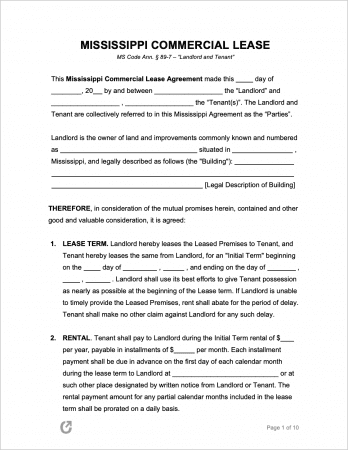
The Mississippi Rental Lease Agreements are written forms used by property managers for the renting of an apartment, home, condo, office, or building. The agreements establish a set of binding requirements for the landlord and tenant(s) that stay in effect for the full length of the lease. The form serves as a neutral reference point, allowing the parties to go back to it in the event of an altercation or a similar issue. Before being signed, the landlord and tenant(s) will sit down and go over each section of the lease to ensure everyone agrees with each point. Although negotiation can occur, it is more common in commercial leasing, where the tenant(s) are business owners.

Commercial Lease Agreement – An editable template used by owners of lots and buildings that are approved for leasing to business tenants.
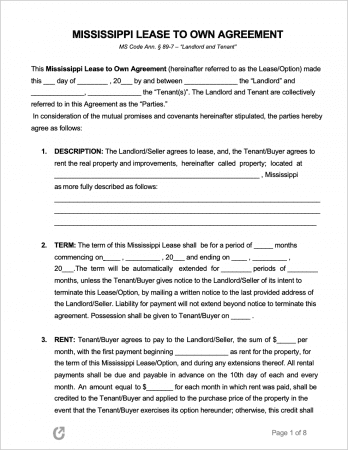
Lease to Own Agreement – Used by homeowners looking to form a lease that permits tenant(s) to purchase their home at the end of the lease (if the tenants so choose).
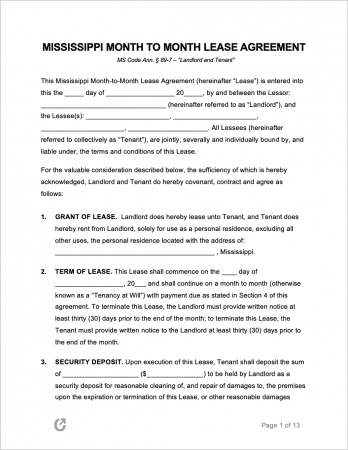
Month-to-Month Rental Agreement – Used for leasing vacation homes and other types of property for single months at a time. Can be terminated by either party with minimal notice.
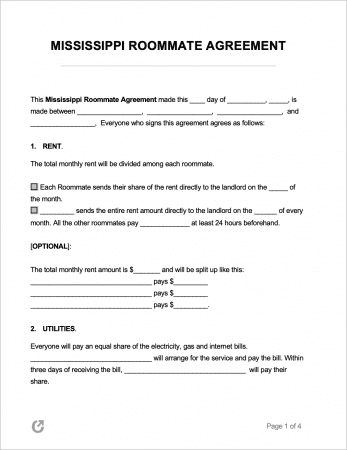
Roommate Agreement – Completed by roommates to encourage the forming of rules regarding common living topics such as guests, personal belongings, shared utility/rent, and much more.
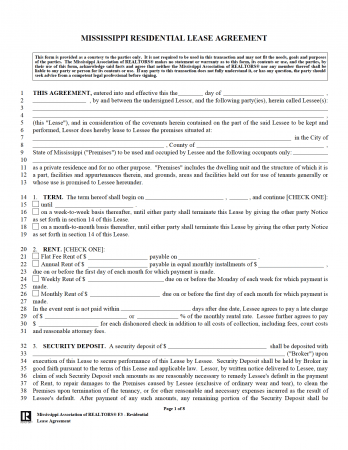
Standard Residential Lease Agreement – The most commonly used leasing document – signed by a landlord and tenant(s) for leasing rentals on a yearly basis.
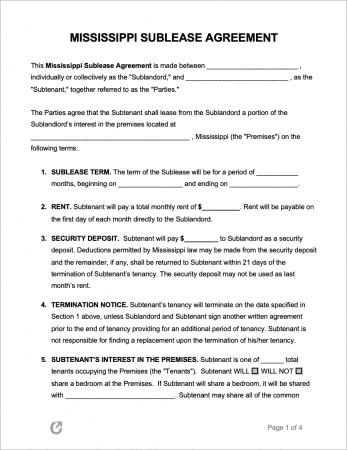
Sublease Agreement – An agreement that details the circumstance whereby a sublandlord (the original tenant) leases part or all of a rented property to a subtenant.
A Mississippi Lease Agreement is a document that establishes a legal record of a given landlord-tenant relationship. Both parties should be able to understand each and every provision so that they fully comprehend how they must conduct themselves. If landlords are still in the process of selecting a suitable tenant, they should distribute rental applications to any individuals they are considering.
Laws
Landlord-Tenant Guides / Handbooks
As state law does not dictate when rent is due, this should be spelled out in the lease agreement. Generally, rent is due on the first of the month. State law does not provide for a grace period, however, landlords wishing to do so can specify this in the lease agreement.
Emergency: There is no state statute regarding landlord access in emergency circumstances. That being said, landlords have the right to enter the rental dwelling without notice in emergency circumstances, as protected by federal law.
Non-Emergency: Mississippi state laws do not provide guidance on the matter of non-emergency landlord access. The rental contract should thus specify this matter in detail. It is recommended that landlords give reasonable notice of at least twenty-four (24) hours prior to entry. Landlords are also advised to only enter on Monday through Friday from 9 a.m. to 6 p.m.
As stated by § 89-8-23, landlords are required to uphold the following duties for the course of the rental agreement:
Tenants are required to comply with the following obligations, as stated by § 89-8-25:
Maximum: State law does not place a cap on the maximum amount a landlord can charge a tenant for a security deposit.
Returning to Tenant (§ 89-8-21(3)): Landlords must return tenant’s security deposits within forty-five (45) days after the termination of tenancy. If there are any deductions the landlord will make due to damages caused by the tenant, the landlord must furnish the tenant with a written that itemizes the amounts claimed.
Deposit Interest: No statute.
Uses of the Deposit (§ 89-8-21(3)): Landlords can lawfully make deductions from the deposit for the following reasons: